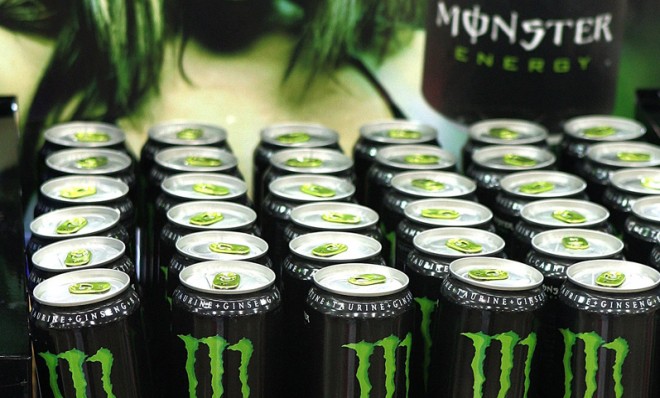Monster Energy vs San Francisco: Are super-caffeinated drinks doomed?
A $10 billion energy drink company is being sued for allegedly marketing dangerous products to children

A free daily email with the biggest news stories of the day – and the best features from TheWeek.com
You are now subscribed
Your newsletter sign-up was successful
San Francisco city attorney Dennis Herrera is suing Monster Beverage for allegedly marketing dangerous, densely caffeinated drinks to kids and teens. That move comes just one week after Monster sued Herrera for demanding the company reduce its energy drinks' caffeine content and stop marketing to children. Herrera says excessive consumption of these caffeine-heavy drinks can lead to cardiac arrest, elevated blood pressure, and seizures. And they're targeted at the young, he says.
The Monster brand is marketed to children and teenagers, the lawsuit said, through sponsorship of youth sports tournaments, profiles of young consumers on its Monster Army websites and promotion of a lifestyle involving extreme sports, music, gaming, military themes and the scantily clad Monster Girls.
Herrera also accused Monster of urging excessive consumption of its drinks, telling customers to "pound down" and "chug down" the products. [Los Angeles Times]
Monster, of course, is fighting back. The company says Herrera is "motivated by publicity rather than science," calls his claims "demonstrably false," and promises "to vigorously defend against this action."
The energy drink industry has enjoyed almost a decade of hyperactive growth. Sales ballooned 240 percent between 2004 and 2009, and have risen steadily since, with total sales of energy drinks and shots reaching over $12.5 billion in 2012. Market researcher Packaged Facts predicts the industry could be worth $21.5 billion by 2017.
The Week
Escape your echo chamber. Get the facts behind the news, plus analysis from multiple perspectives.

Sign up for The Week's Free Newsletters
From our morning news briefing to a weekly Good News Newsletter, get the best of The Week delivered directly to your inbox.
From our morning news briefing to a weekly Good News Newsletter, get the best of The Week delivered directly to your inbox.
Within this thriving industry, Monster is the biggest fish, with a market capitalization of nearly $10 billion. And Monster's share price jumped an impressive 12.5 percent in April.
Could this marketing-to-youngsters controversy put the brakes on Monster's surging growth? The allegations are certainly stacking up. The family of a 14 year-old Maryland girl is suing Monster, claiming their daughter died of cardiac arrhythmia after drinking a 24-ounce can of Monster that contained some 240 milligrams of caffeine — far more than the recommended maximum for teens. And as the New York Times reported in October, five similar accusations have arisen in the last three years.
In the Maryland case, Monster says that because no blood work was performed, the family has no way of proving their daughter died of caffeine toxicity, says the Washington Post. And the company stands by its current warning labels, which recommend a limit of one drink every four hours, and no more than three per day. Monster also insists that its drinks are not recommend for children (anyone under 12), pregnant women, or people who are "sensitive to caffeine."
But even if Monster manages to swat down Herrera's accusations, it looks like other energy drink foes will be waiting in the wings. Last summer, New York subpoenaed energy drink makers, including Monster, over their marketing techniques. And the FDA recently announced plans to investigate the effects caffeinated food products have on children and adolescents. From an FDA statement:
A free daily email with the biggest news stories of the day – and the best features from TheWeek.com
One pack of [caffeinated] gum is like having four cups of coffee in your pocket. Caffeine is even being added to jelly beans, marshmallows, sunflower seeds and other snacks for its stimulant effect.
Meanwhile, "energy drinks" with caffeine are being aggressively marketed, including to young people. An instant oatmeal on the market boasts that one serving has as much caffeine as a cup of coffee, and then there are similar products, such as a so-called "wired" waffle and "wired" syrup with added caffeine.
The proliferation of these products in the marketplace is very disturbing to us. [FDA]
Carmel Lobello is the business editor at TheWeek.com. Previously, she was an editor at DeathandTaxesMag.com.
-
 Alexei Navalny and Russia’s history of poisonings
Alexei Navalny and Russia’s history of poisoningsThe Explainer ‘Precise’ and ‘deniable’, the Kremlin’s use of poison to silence critics has become a ’geopolitical signature flourish’
-
 Are Hollywood ‘showmances’ losing their shine?
Are Hollywood ‘showmances’ losing their shine?In The Spotlight Teasing real-life romance between movie leads is an old Tinseltown publicity trick but modern audiences may have had enough
-
 A dreamy long weekend on the Amalfi Coast
A dreamy long weekend on the Amalfi CoastThe Week Recommends History, pasta, scenic views – this sun-drenched stretch of Italy’s southern coast has it all